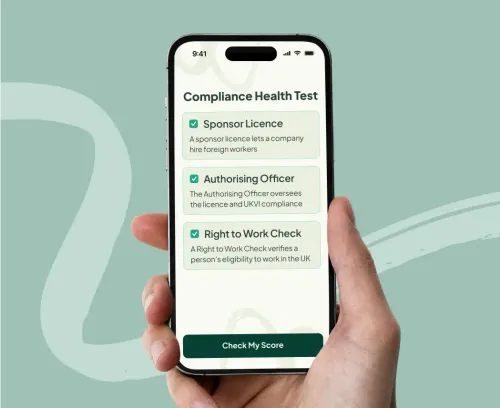UK Temporary Shortage List: What It Means for Skilled Worker Visa Sponsors
- Shortage Occupation List – Immigration Salary List – Temporary Shortage List
- What Is the Temporary Shortage List?
- Which Occupations Will Be Included in the Temporary Shortage List?
- What Does the Temporary Shortage List Mean for Employers?
- Shortage Occupation vs Immigration Salary vs Temporary Shortage Lists Comparison
As part of the UK's Skilled Worker visa changes 2025, the UK Government has announced the introduction of the Temporary Shortage List (TSL). Detailed in the May 2025 Immigration White Paper, the TSL is proposed to replace the Immigration Salary List, representing a significant shift in how the UK addresses short-term labour shortages in sub-degree roles.
On 1 July 2025, the UK Government published Statement of Changes HC 997, confirming a major shift in the country’s immigration policy. From 22 July 2025, the minimum skill level for jobs under the Skilled Worker route is raised from RQF Level 3 to RQF Level 6. This decision opens the route only to graduate-level occupations or those listed on the new shortage lists – the expanded Immigration Salary List (ISL) and the new Temporary Shortage List.
While specific official detailes are yet to be published, this article provides a comprehensive breakdown of what we know about the Temporary Shortage List right now, how it differs from previous frameworks like the Shortage Occupation List and the Immigration Salary List, and what it means for employers, Skilled Worker sponsors, and those navigating the Skilled Worker visa UK new rules.
Shortage Occupation List – Immigration Salary List – Temporary Shortage List
The UK's approach to managing labour shortages through immigration has evolved significantly in recent years. The Shortage Occupation List (SOL) was originally used to identify occupations where UK employers faced difficulties recruiting local talent. Being on the shortage occupation list meant employers could sponsor overseas skilled workers at lower salary thresholds and reduced visa fees, making it easier and more cost-effective to hire foreign talent into high-demand roles.
In April 2024, the government replaced the SOL with the Immigration Salary List (ISL). The immigration salary list UK continued to support certain visa jobs, allowing sponsors to pay 80% of the going rate for eligible roles. However, it applied a broad brush approach, covering a wide range of roles with limited strategic oversight and no sector-level conditions.
Now, under the UK skilled worker visa changes 2025, the Temporary Shortage List is being introduced as a more controlled and conditional system. It will apply only to sub-degree level roles (RQF Level 3–5) and offer time-limited access to the Skilled Worker visa UK jobs route.
What Is the Temporary Shortage List?
The Temporary Shortage List (TSL) is being introduced as part of the UK Skilled Worker visa changes 2025, replacing the Immigration Salary List. It will apply to occupations requiring RQF Level 3–5 skills—those below degree level.
The TSL allows temporary and conditional access to the Skilled Worker route for roles that meet strict criteria. Unlike the Shortage Occupation List UK, the TSL does not offer reduced salary thresholds. Under the UK Skilled Worker visa changes 2025, the Temporary Shortage List UK 2025 will introduce a number of important conditions for roles eligible under this route. Key features include:
- Conditional Access Based on Workforce Planning
To hire overseas workers for roles on the TSL, employers must show they are actively working to reduce dependency on immigration. This includes developing a sector-wide workforce strategy, investing in UK-based recruitment and training, and cooperating with public bodies such as Skills England and the Department for Work and Pensions. Access under the Skilled Worker visa UK list will only be granted where this evidence is provided.
- Targeted Skilled Occupations
The Temporary Shortage List will apply only to selected occupations that support the UK’s industrial strategy or critical national infrastructure. This may include specific roles in construction and other sectors identified as experiencing severe labour shortages. Only roles identified in the Skilled Worker visa eligible occupations and codes will be considered.
- Limited Duration for Inclusion
Jobs will be added to the TSL for a fixed period. This temporary status will provide short-term access to the Skilled Worker visa UK jobs route for professions facing confirmed shortages, but inclusion may be removed if domestic labour conditions improve. Unlike the older UK Shortage Occupation List, this will not be a permanent or long-term list.
- Possible Restrictions on Dependants
Some roles on the Temporary Shortage List may be subject to additional restrictions. These may include limitations on bringing family members under the Skilled Worker visa sponsor list, time limits on leave, or visa number caps. These conditions are intended to ensure that use of the Skilled Worker route remains temporary and targeted.
Which Occupations Will Be Included in the Temporary Shortage List?
The Temporary Shortage List UK 2025 will cover visa jobs that:
- Are classed at RQF Level 3–5 (i.e. below degree level)
- Are identified as being in persistent shortage based on advice from the Migration Advisory Committee (MAC)
- Are essential to the UK’s industrial strategy or critical infrastructure
Here's the full list of eligible occupations on the Temporary Shortage List:
• 1243 Managers in logistics
• 1258 Directors in consultancy services
• 3111 Laboratory technicians
• 3112 Electrical and electronics technicians
• 3113 Engineering technicians
• 3114 Building and civil engineering technicians
• 3115 Quality assurance technicians
• 3116 Planning, process and production technicians
• 3120 CAD, drawing and architectural technicians
• 3131 IT operations technicians
• 3132 IT user support technicians
• 3133 Database administrators and web content
technicians
• 3412 Authors, writers and translators
• 3414 Dancers and choreographers
• 3417 Photographers, audio-visual and broadcasting
equipment operators
• 3422 Clothing, fashion and accessories designers
• 3429 Design occupations not elsewhere classified – only the following job types:
o Industrial and product designers
o Packaging designers
o Performance make-up artists
o Set designers
o Visual merchandising managers and designers
• 3512 Ship and hovercraft officers
• 3520 Legal associate professionals
• 3532 Insurance underwriters
• 3533 Financial and accounting technicians
• 3541 Estimators, valuers and assessors
• 3544 Data analysts
• 3549 Business associate professionals not elsewhere classified – only the following job types:
o Business support officers
o Business systems analysts
o Contract administrators
o Clinical coders
o Clinical trials administrators
o Research coordinators
• 3552 Business sales executives
• 3554 Advertising and marketing associate professionals
• 3571 Human resources and industrial relations officers
• 3573 Information technology trainers
• 4121 Credit controllers
• 4122 Book-keepers, payroll managers and wages clerks
• 4129 Financial administrative occupations not elsewhere classified – only the following job types:
o Box office assistants
o Grants officers
o Mortgage administrators
o Revenue assistants (excludes National and Local
government revenue occupations)
o Treasury assistants
• 4132 Pensions and insurance clerks and assistants
• 5213 Welding trades
• 5214 Pipe fitters
• 5223 Metal working production and maintenance fitters
• 5225 Air-conditioning and refrigeration installers and
repairers
• 5231 Vehicle technicians, mechanics and electricians
• 5232 Vehicle body builders and repairers
• 5233 Vehicle paint technicians
• 5235 Boat and ship builders and repairers
• 5241 Electricians and electrical fitters
• 5242 Telecoms and related network installers and
repairers
• 5244 Computer system and equipment installers and
servicers
• 5245 Security system installers and repairers
• 5249 Electrical and electronic trades not elsewhere
classified
• 5311 Steel erectors
• 5315 Plumbers and heating and ventilating installers and
repairers
• 5319 Construction and building trades not elsewhere classified – only the following job types:
o Builders
o Divers
o Fence erectors
o Industrial climbers
o Remotely Operated Vehicle (ROV) operators
o Steel fixers and underpinners
• 5322 Floorers and wall tilers
• 5323 Painters and decorators
• 5330 Construction and building trades supervisors
• 8133 Energy plant operatives
A role will only be added to the Temporary Shortage List UK 2025 if several eligibility requirements are met. First, the Migration Advisory Committee (MAC) must confirm that there is a genuine and persistent labour shortage in that occupation. Second, the sector must submit a credible and detailed workforce strategy, demonstrating active investment in UK-based recruitment and training. This includes collaboration with national organisations such as Skills England and the Department for Work and Pensions (DWP), as well as evidence of efforts to improve working conditions and protect migrant workers. Strategies must be forward-looking and show how the sector intends to reduce its reliance on Skilled Workers from overseas.
The MAC will evaluate these sector-level plans and submit recommendations to the Home Secretary. These recommendations may also include specific visa conditions such as caps on the number of sponsored workers, restrictions on dependants, and time-limited permission to remain in the UK under the Skilled Worker visa sponsor list. This approach reflects a departure from the broader access granted under earlier versions of the UK Shortage Occupation List 2024 jobs or the Tier 2 sponsorship list, where long-term reliance on immigration was more common.
In parallel, the Labour Market Enforcement (LME) Group will monitor sponsorship of roles at RQF Level 6 and above. If evidence shows that employers are relying too heavily on Skilled Worker visa UK list roles at graduate level, the LME may recommend that those sectors also develop formal workforce strategies. If sufficient progress is not demonstrated over time, the MAC may advise the government to limit or remove Skilled Worker visa eligibility for those roles as well.
The TSL will therefore function not as a long-term solution, but as a tool for managing short-term workforce shortages while sectors demonstrate meaningful steps toward building sustainable recruitment pipelines within the UK. Unlike the shortage occupation list, access will be granted only where strategic reform is evident and outcomes are monitored.
Is Your Sponsor Licence at Risk?
Over 1500 Sponsor Licences were suspended or revoked in 2024. Take our free test to check if your licence is at risk – uncover your compliance gaps and receive tailored recommendations from our experts.

What Does the Temporary Shortage List Mean for Employers?
The introduction of the Temporary Shortage List (TSL) under the UK Skilled Worker visa changes 2025 will significantly affect how employers recruit for Skilled Worker visa UK jobs at RQF Level 3–5. Under the new framework, sub-degree level roles will only qualify for sponsorship if they are listed on the TSL. This marks a shift from the broader access previously granted under the Immigration Salary List and the UK Shortage Occupation List 2024.
Given the level of scrutiny and the potential for rapid changes to the occupation shortage list UK, sponsors should act now to ensure readiness.
Some recommended actions for sponsors include:
- Reviewing all roles currently sponsored under RQF Level 3–5 to confirm future eligibility under the TSL
- Mapping each job to the correct Standard Occupational Classification (SOC) code using the latest Skilled Worker SOC codes and the list of SOC codes UK
- Auditing salaries and job descriptions to ensure they meet the Skilled Worker visa eligible occupations and codes criteria
- Engaging with sector bodies to contribute to collective skills list planning and workforce strategy submissions
- Planning for the future, as roles can be removed from the Temporary Shortage List with limited notice, affecting future sponsorship options
Let Us Handle the Hard Part
The UK Skilled Worker Visa process may be complicated — but we make it easy. Nation.better simplifies every step, from securing your sponsor licence to ensuring compliance, so you can focus on hiring the talent your business needs

Shortage Occupation vs Immigration Salary vs Temporary Shortage Lists Comparison
| Feature | Shortage Occupation List (SOL) | Immigration Salary List (ISL) | Temporary Shortage List (TSL) |
|---|---|---|---|
| Skill-level coverage | Roles that met the Skilled Worker skill requirement in force at the time (RQF 3 +) | Same (RQF 3 +). List created when SOL rules were lifted into the ISL in April 2024 | RQF 3–5 only. RQF 6+ roles will use the main Skilled Worker route |
| Salary discount | 20% discount on the occupation-specific threshold (going-rate discount) | 20% discount on the general threshold (£30,960 instead of £38,700) | No discount promised; full Skilled Worker thresholds will apply |
| Type of access | Ongoing access; list updated when the Home Secretary commissions MAC | Transitional list; access continues until ISL is abolished | Time-limited access only. Every occupation must pass MAC test each time it is reviewed |
| Job inclusion requirements | Evidence of national shortage | Evidence of national shortage + salary below new general threshold | Shortage plus MAC-approved sector workforce strategy |
| Review cycle | Ad-hoc MAC reviews when commissioned (≈ every 3–4 years) | Rapid review Feb 2024; full review commissioned for late 2024; otherwise ad-hoc | List to be “regularly reviewed”; roles can be removed quickly after each MAC report |

